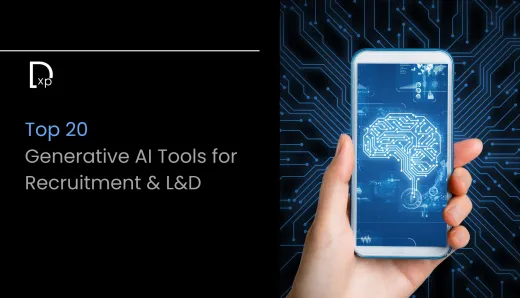Can Generative AI Replace Recruiters? Maybe Not, But It Can Supercharge Them

Let’s cut to it. People keep asking if Generative AI in HR in India will replace recruiters. It won’t. But if you think it won’t change the role completely, you’re kidding yourself.
Recruiters today aren’t just posting jobs and scheduling calls. They’re brand storytellers, relationship builders, culture translators, and speed operators. But here’s the reality, they’re buried under repetitive work that doesn’t need a human brain. And that’s where generative AI steps in.
AI isn’t coming for recruiters. It’s coming for recruiter tasks.
Most of what eats up a recruiter’s time has nothing to do with judgment or people skills. It’s sourcing from outdated databases. Writing generic messages. Scheduling interviews across four calendars. Creating reports for hiring managers who barely read them.
Now imagine a system that handles all that instantly. That’s what Generative AI in HR in India is doing right now. Not in theory. Not next year. Right now.
AI writes job descriptions based on market benchmarks. It tailors outreach for different candidate personas. It chats with applicants, answers FAQs, and filters out the noise before you even look at a resume. It even predicts drop-off risk based on past engagement patterns.
You’re not being replaced. You’re being upgraded.
The recruiter’s value is moving up the ladder
When you take the grunt work off your plate, here’s what’s left: conversations that matter. Candidates don’t remember the email you sent. They remember how you made them feel in the interview. They remember how clearly you described the team. How fast you moved. How transparent you were.
That’s the human stuff. That’s what you’re freed up to do when AI handles the rest.
With Generative AI in HR in India, recruiters get to spend more time on coaching hiring managers, fixing broken candidate journeys, and closing hard-to-fill roles. That’s what moves the needle. Not another two hours spent formatting a tracker.
But you still need judgment. AI doesn’t know your culture
Here’s where the hype ends. Generative AI can rank resumes, summarize interviews, and score tone in candidate responses. But it doesn’t know what your culture feels like. It can’t sense when a candidate is bullshitting or when they’re just nervous.
It can’t tell if your team is burning out and this next hire needs to be more of a stabilizer than a disruptor.
That judgment call: the pattern recognition, the gut check, the long-term fit radar, that still sits with you. That’s the part AI doesn’t get. And that’s why recruiters aren’t going anywhere.
Recruiters who ignore AI will get replaced by recruiters who don’t
This is the actual threat. Not AI itself. But the recruiter sitting across the table who’s using AI to source 3x faster, write sharper emails, get cleaner data, and spend more time building real connections.
If you're still manually scanning LinkedIn, while someone else is running auto-personalized campaigns based on behavioral data, you're already losing.
If you're sending cookie-cutter messages, while someone else is testing which tone gets the best reply rate, you're falling behind.
If you're still stuck in spreadsheets, while someone else is using dashboards that predict fill time, drop-off risk, and bottlenecks, you're in trouble.
India’s talent market doesn’t wait for anyone
Let’s talk about India specifically. You’ve got volume. You’ve got diversity. You’ve got tech talent being hunted globally. And you’ve got recruiters running at full capacity already.
Generative AI in HR in India is giving those recruiters real leverage. It’s not about replacing them. It’s about turning a five-person team into a ten-person output. It’s about doing more without burning out. And it’s about finally getting to the parts of the job that actually require a human.
Like building trust. Navigating politics. Coaching candidates who are on the fence. Being the voice of reason in broken interview panels. None of that is going away.
So, what do smart recruiters do now?
Simple. They start using AI, but don’t surrender to it.
They let it take over the low-value work. They train it on their tone and their process. They test what works, and tweak what doesn’t. They stop fearing it and start using it to reclaim their actual job, being strategic, relational, and fast.
The recruiters who win in 2025 are the ones who team up with AI, not compete with it.
Because here’s the truth no one tells you: the future isn’t AI vs recruiters. It’s recruiters + AI vs everyone else.




